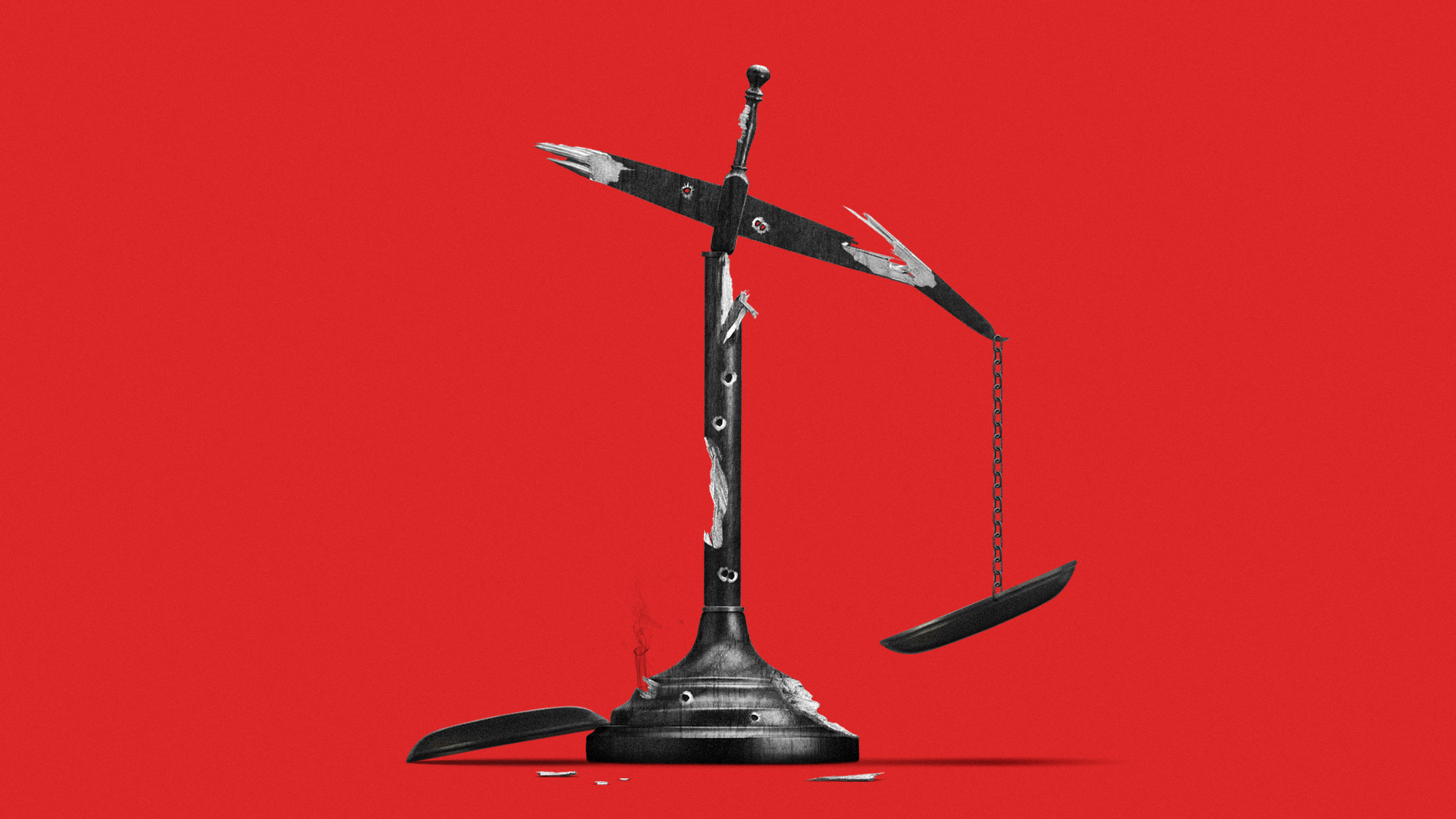Is international law falling apart?
Conflict in Gaza is testing the strength of the two intergovernmental courts in The Hague

A free daily email with the biggest news stories of the day – and the best features from TheWeek.com
You are now subscribed
Your newsletter sign-up was successful
Israeli officials reportedly fear that the International Criminal Court (ICC) may issue arrest warrants for Prime Minister Benjamin Netanyahu and other senior government figures.
Such a move, which might extend to Hamas leaders, "would probably be seen in much of the world as a humbling moral rebuke, particularly to Israel", over the war in Gaza, said The New York Times.
But it would also represent "awkward tidings" from The Hague to the US, said Andreas Kluth for Bloomberg. If Washington is tempted to "do the convenient rather than the principled thing" and dismiss the ICC tribunal, it would undermine "one of the greatest achievements of postwar American leadership: the development of international humanitarian law".
The Week
Escape your echo chamber. Get the facts behind the news, plus analysis from multiple perspectives.

Sign up for The Week's Free Newsletters
From our morning news briefing to a weekly Good News Newsletter, get the best of The Week delivered directly to your inbox.
From our morning news briefing to a weekly Good News Newsletter, get the best of The Week delivered directly to your inbox.
What did the commentators say?
The ICC – not to be confused with the International Court of Justice (ICJ), which hears cases brought against nation states – is the "world's only supranational tribunal that can try individuals for war crimes and other atrocities", said Kluth.
Both Israel and the US do not recognise the ICC's jurisdiction, and it "doesn't have its own police force or army – a recurring problem with enforcing international law in general". An accused individual would only be locked up if they travel to a signatory country and that government "puts on the handcuffs".
The ICJ is "also causing headaches for the US and Israel" as it deliberates claims brought by South Africa that state-led genocide has been committed against Palestinians in Gaza. This week, Turkey joined Colombia in formally requesting to join the case against Israel, which has been described by the US as "completely without any basis in fact".
So far, the ICJ has said that Israel's actions could amount to genocide and ordered it to take measures to prevent it, rather than declaring that the assault "was genocide full stop", said New York magazine. The court is expected to rule again in the coming years, though. If the US then dismissed more solid findings or failed to rein in its ally, the consequences would be "catastrophic not only for the Palestinians but for the whole 'rules-based international order' that the US built in the aftermath of World War II".
A free daily email with the biggest news stories of the day – and the best features from TheWeek.com
The Gaza conflict is "an extreme example of the breakdown of the law of war, but it is not an isolated one", said Oona A. Hathaway in Foreign Affairs. The wars since 9/11 have "chipped away at protections for civilians" established through the Geneva Conventions of 1949.
Washington has used its powers to "weaken constraints on the use of force, aggressively interpret the right to self-defence, and allow for more expansive targeting of dual-use sites and structures", which has placed more civilians in harm's way. Other countries, including France, Israel, Saudi Arabia, Turkey and the UK, have since "loosened constraints on their own militaries".
The law of war also "began eroding" partly because conflict "increasingly involves non-state actors", such as Islamic State or Hamas, blurring "the crucial distinction" on which humanitarian law rests, said Kluth. "Is a woman in plain clothes who plants a bomb a combatant or a civilian?" he asked. "What about a hospital in which terrorists also hide weapons?"
What next?
"In many ways the notion of international law is a fantasy," said Michael Sexton for The Australian, as the only law that can be enforced within a country "is that created by its own domestic political processes".
Israel might simply not observe orders from the ICJ. The UN Security Council could, in theory, send forces into Gaza to enforce them. But "in practice", this could be vetoed by any of the five permanent members of the council and it "seems unlikely" that the US would agree.
It is tempting to conclude that international laws "hold little meaning today", said Hathaway, but "even a hobbled system of international humanitarian law has made conflict more humane". At a time when "the laws of war are once again being severely tested", the US must "act now to renew and strengthen them".
Chas Newkey-Burden has been part of The Week Digital team for more than a decade and a journalist for 25 years, starting out on the irreverent football weekly 90 Minutes, before moving to lifestyle magazines Loaded and Attitude. He was a columnist for The Big Issue and landed a world exclusive with David Beckham that became the weekly magazine’s bestselling issue. He now writes regularly for The Guardian, The Telegraph, The Independent, Metro, FourFourTwo and the i new site. He is also the author of a number of non-fiction books.
-
 Local elections 2026: where are they and who is expected to win?
Local elections 2026: where are they and who is expected to win?The Explainer Labour is braced for heavy losses and U-turn on postponing some council elections hasn’t helped the party’s prospects
-
 6 of the world’s most accessible destinations
6 of the world’s most accessible destinationsThe Week Recommends Experience all of Berlin, Singapore and Sydney
-
 How the FCC’s ‘equal time’ rule works
How the FCC’s ‘equal time’ rule worksIn the Spotlight The law is at the heart of the Colbert-CBS conflict
-
 Trump vs. BBC: what’s at stake?
Trump vs. BBC: what’s at stake?The Explainer The US president has filed a $10 billion lawsuit over the editing of Panorama documentary, with the broadcaster vowing to defend itself
-
 The Supreme Court case that could forge a new path to sue the FBI
The Supreme Court case that could forge a new path to sue the FBIThe Explainer The case arose after the FBI admitted to raiding the wrong house in 2017
-
 ICC under attack: can court continue to function?
ICC under attack: can court continue to function?Today's Big Question US sanctions 'designed not only to intimidate court officials and staff' but 'also to chill broader cooperation', say rights group
-
 'Libel and lies': Benjamin Netanyahu's corruption trial
'Libel and lies': Benjamin Netanyahu's corruption trialThe Explainer Israeli PM takes the stand on charges his supporters say are cooked up by a 'liberal deep state'
-
 How would assisted dying work in the UK?
How would assisted dying work in the UK?The Explainer Proposed law would apply to patients in England and Wales with less than six months to live – but medics may be able to opt out
-
 Assisted dying: will the law change?
Assisted dying: will the law change?Talking Point Historic legislation likely to pass but critics warn it must include safeguards against abuse
-
 The EU's landmark AI Act 'rushed' out as countdown begins on compliance
The EU's landmark AI Act 'rushed' out as countdown begins on complianceThe Explainer 'We will be hiring lawyers while the rest of the world is hiring coders' – Europe's warning about new AI legislation
-
 How a Cherokee tribe used tribal sovereignty to open North Carolina's only legal cannabis dispensary
How a Cherokee tribe used tribal sovereignty to open North Carolina's only legal cannabis dispensaryUnder the radar The tribe has plans to open sales to any adult in the state, even though the drug is still illegal there